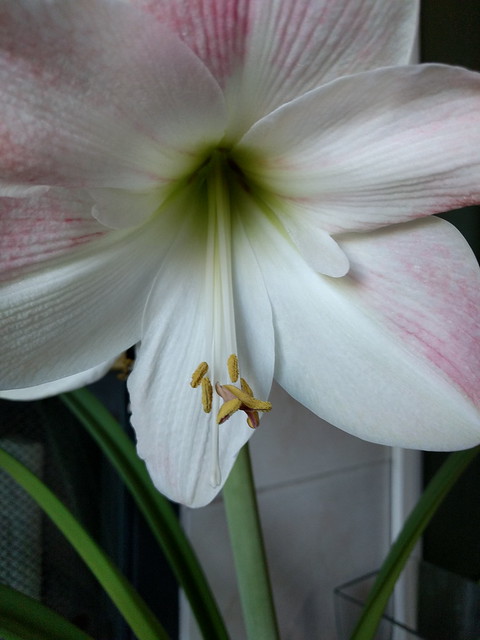Sometimes, you’re just not ready for the holidays when everyone else is… if you hated Christmas last year, this might be for you.
A friend a few weeks ago was talking about how hard it had been for her to recover from the death of her father. She’d thrown herself into finishing graduate school and getting a good job, ignoring the loss of any real meaningfulness to these activities. “I was working as hard as I could to ‘make it,’ but it wasn’t making sense to me,” she said. “This ‘brightside’ culture we live in wouldn’t allow me to admit that I’d hit a downward spiral when my father died, and I’d never recovered.”
I’d never heard of the phrase, “bright-side culture,” but my friend was using it to describe not only American culture, but the faith community in which she grew up. Predicated on the idea that Christians are a joyful people, ‘bright-side culture’ exists to keep us on the sunny side. If you are not particularly sunny, worse, if you are actively unhappy, or in any way deviating from that joyful #blessed life, you are saying somehow that God is at fault, or not enough for you… and for Christians, that’s anathema. No one wants to admit that something within might be broken.
We might assume that only within Christian religious circles do people have this overwhelming pressure of happiness, but it’s rising all around us. Google hired a “Chief Happiness Officer.” Yep, seriously – and Google’s not the only one. Yale University’s ‘Psychology and the Good Life’ saw 1200 students enrolling this past autumn, because it’s billed as a twice weekly course on “how to be happy.” Gallup polls suggest that this is true not just of undergrads – but of most Americans. Though we have more than we’ve ever had before, the buoyant, ebullient, stereotypical American optimism is failing. We are – as a culture – not happy.
It’s a strange time in American history.
It might a good time in American history to stop avoiding our truths, however.
We were really thoughtful this past holiday, reading write-ups of area churches doing Blue Christmas services. Especially when there’s so much enforced cheer to go around during the holidays, which plunges so many into unanticipated depression, Blue Christmas services essentially provide a place to weep and be unapologetically morose without the pressure of being greeted with “Happy Holidays!” or the gaudy brightness of bows and colored lights. A choir-mate this year lost her husband after our second concert, and we thought of her on Christmas day, wretchedly trying to make the season bright for her children. Sometimes, it’s pointless to pretend. We need to identify and affirm that we are, at times, deeply unhappy.
The original Christmas story remembers darkness – the magi were watching dark skies for portents when they saw the natal star. “The people that walked in darkness” are the same people who eventually see “a great light,” but not everyone walks at the same pace. The light comes to everyone different times.
This doesn’t mean it isn’t there, however.
We have often found the light after the worst of times – when we really think, “Okay, this is some CRAP, and we’re done.” Sometimes we find that light simply by watching the skies, and waiting; breathing through the distress. Other times, we find that light by doing something for others which reignites our own flame. The writer Omid Safi suggests doing a good turn for someone, stating, “Even more, there is something about a righteous deed that is virtuous in itself: It is faith in the loveliness of a simple act of kindness — apart from whether it will be reciprocated, whether we will live long enough to see its fruits. Acts of beauty are redemptive in and of themselves. So let us, friends, keep planting.” (If you need a little brightening, read his whole brief essay on planting and the hope it genders on the days we’re sure the world won’t be around long enough for us to see a seed grow.)
As we’re dragging ourselves along – some newly ill, others rebounding through variation 430,959,806 of whatever this cough-fever-chills thing is; some slogging through work, others on the endless interview rotation, and fearing they’ll never find a job, remember that hope is not mere optimism. Optimism is based on …optics, how we see the world. In the words of Desmond Tutu, “Hope is being able to see that there is light despite all of the darkness.” Hope is a refusal to surrender, so keep walking, keep planting, and keep going.
Happy Monday.

OH. That line about ‘optimism is based on optics’ is fabulous. Not in the ‘put on your rose coloured glasses’ annoyance, but a reminder to stand still and look steadily at something instead of whirling in a myopic blur.
It is surprising to me that sometimes the best way through the down sides is to fully wallow and admit exactly how awful it all is.
Which is exactly what I’m allowing myself to do for a couple more days.
Y’all feel better soon!
Thought provoking and inspiring. I’ve not heard of Safi, so thank you for the link to his essay. I know a couple who has recently emerged from the grip of the severe depression the husband suffers from. The weather where they live is no help most of the year and with life “out there” in the last year being so challenging to process, they decided to start a campaign to grow hope from the simple acknowledgement of observing an act of kindness. They’re inspiring as well.
I’ve never really been an unhappy person. Perhaps it’s that I make whatever change (sometimes quite drastic) necessary to right things in my mind–or heart. The not so drastic action of noticing the spots of brilliance in each day are like breathing to me. I appreciate them–and breathing!